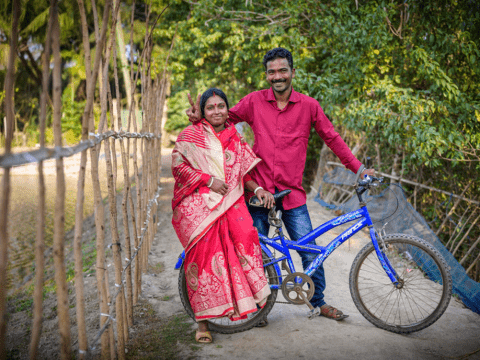USAID supports couples through male engagement for gender equality

Bangladesh has made great progress in poverty reduction, economic growth, and improvements around maternal and neonatal health. However, this growth doesn’t always translate into economic gains across both genders.
Only 4 percent of women in Bangladesh participate in economic activities outside the home, compared to 70 percent of men. National average data from the Bangladesh Demographic Health Survey in 2014 indicated that for 13.1 percent of women, the husband controlled their cash earnings. In southwest Bangladesh, the median age of marriage for girls was 15.2, with the mean age of first pregnancy 16.9.
It is in this context that USAID’s Nobo Jatra activity, implemented by World Vision works to improve immediate gender relations between couples, reduce gender-based violence and child marriage rates. One way the project does this is by involving husbands and wives, like Jayantha and Parbati Das in male engagement sessions.
Like many couples living in southwest Bangladesh – and indeed, around the world – Jayantha didn’t always value Parbati’s work around the home and for their children. After attending Nobo Jatra’s Male Engagement sessions, things have transformed.
“My husband has changed a lot,” says Parbati. “He helps take care of our child. He takes him to school. He helps in the household, especially when I am sick. He never did this in our last four years of married life”.
Sessions are staggered over 9 months and 12 couples meet with a facilitator every 15 days. Best of all, facilitators report that the couples become catalysts, sharing their knowledge with others in the area and also set a good example to their own children.
“Think about a bicycle,” says Jayantha. “It has two wheels. If one wheel is damaged or leaky, it won’t work anymore. The husband and wife are like the wheels of the bicycle. If someone doesn’t feel happy, the household could be damaged.”
“Before Nobo Jatra,” says Parbati, “I didn’t imagine our relationship could be like this.”
Proshanto, another Male Engagement participant and one of Das family’s neighbors, confirmed, “Jayanta would frequently quarrel with his wife; he even would beat her at times. To avoid such problems, his wife would go to her parent’s home. But after their participation in the training arranged by Nobo Jatra, I have noticed some changes in their behavior. The couple now spend time together, and seem happy and cheerful.”
Similar changes are visible in Proshanto’s life too. His wife Multi Das said “Before this class, my husband didn’t acknowledge me, he didn’t give me any recognition. He would say, ‘You are doing nothing. I am earning outside.’ Sometimes when I asked if he could hold our girl, he would reply, ‘This is not my work.”
“Before, I did not understand,” says Proshanto. “I thought what my wife was doing was valueless. Now I understand that it is time-consuming and essential. She takes care of our livestock, collects water, and takes the children to school.”
“Day by day, I saw the behavior of my husband was changing,” says Mukti. “Yesterday, I asked my husband to take our child to school, and he promised he would take care of it.”
With USAID’s support, Nobo Jatra has helped over 7,000 couples like Jayantha and Parbati, Proshanto and Mukti to improve relationships, communicate better and understand the risks of child marriage. When Nobo Jatra first started implementing, only 8% of men thought that they should share household and child care tasks. Today, almost 60% say that husbands and wives should work together on household chores and caregiving for children.
The impact of male engagement sessions is also visible in the wider community. Census data captured by Nobo Jatra in 2017 shows that 9.5% of girls aged between 12-17 years were married. Remarkably, in 2019, 7.6% of girls aged between 12-17 years were married - showing a 1.9% reduction in early marriage rates since 2017. This reduction is due to a number of factors and combined efforts – however, male engagement sessions have also certainly played a role in reducing the practice of child marriage.
To sustain the this impact, Nobo Jatra is working to embed the approach and key messages in Government Child Protection Committees at the union, sub district and district level; and into the existing programs of the Department of Women Affairs.